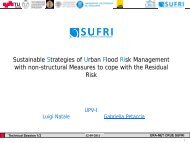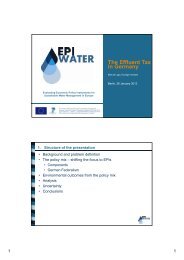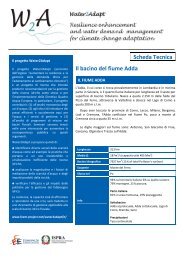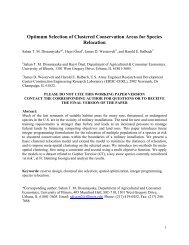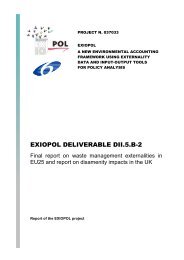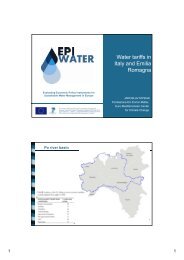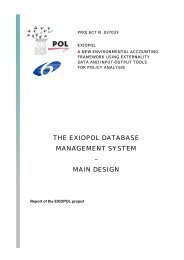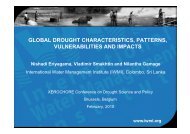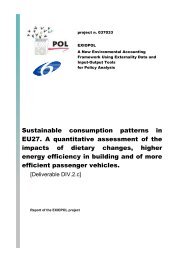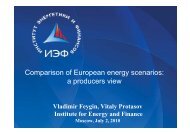Gulf and European Energy Supply Security - Feem-project.net
Gulf and European Energy Supply Security - Feem-project.net
Gulf and European Energy Supply Security - Feem-project.net
Create successful ePaper yourself
Turn your PDF publications into a flip-book with our unique Google optimized e-Paper software.
<strong>Energy</strong> <strong>Security</strong>: Potential for EU-GCC Cooperation<br />
Although the long-term trend points to LNG<br />
taking a growing share of gas trade, future global<br />
gas requirements are very difficult to predict. The<br />
development of Alberta tar s<strong>and</strong>s would require<br />
extensive use of Canadian gas, which would<br />
subsequently not be available for export to the US.<br />
On the other h<strong>and</strong>, the US possesses very large<br />
unconventional gas reserves. As the IEA notes: “In<br />
the reference scenario, unconventional gas output<br />
worldwide rises from 367 bcm in 2007 to 629<br />
bcm in 2030, with much of the increase coming<br />
from the United States <strong>and</strong> Canada. The share of<br />
unconventional gas in total US gas production rises<br />
from over 50% in 2008 to nearly 60% in 2030.” 24<br />
If the US starts producing such large volumes<br />
of unconventional gas, its need for imported LNG<br />
would be much lower. China’s <strong>and</strong> India’s needs<br />
also are difficult to predict. It is therefore not<br />
certain that the gas market will favor sellers in the<br />
future, <strong>and</strong> it is also not certain that the increase<br />
of LNG trade will bring competition detrimental to<br />
<strong>European</strong> energy security. LNG transportation costs<br />
will never be as low as for oil, <strong>and</strong> regasification<br />
plants are still relatively few (although this is about<br />
to change).<br />
The gas market will most probably continue to<br />
primarily use long-term contracts in order to share<br />
the heavy upstream investment costs between the<br />
producer <strong>and</strong> the customer. Nevertheless, shortterm<br />
contracts <strong>and</strong> spot sales will have growing<br />
importance in satisfying marginal changes in the<br />
dem<strong>and</strong>/supply relationship. LNG will also allow<br />
for a greater fluidity of the market <strong>and</strong> allow the<br />
EU to partially diversify its sources by tapping<br />
exporters inaccessible by pipelines. Concerning<br />
geopolitical issues, LNG is not fully risk-free. The<br />
entire transportation chain could be threatened by<br />
terrorist acts <strong>and</strong> the explosion of a regasification<br />
plant could have a very negative influence on the<br />
public perception of this energy source. Maritime<br />
routes also present certain risks. However, the<br />
probabilities of such events remain small, <strong>and</strong> even<br />
if one occurred, its consequences would be minor<br />
for global trade.<br />
The role of LNG is growing in Europe <strong>and</strong><br />
regasification capacities are exp<strong>and</strong>ing, with new<br />
plants currently being built in Spain, Italy, the<br />
Netherl<strong>and</strong>s <strong>and</strong> Sweden <strong>and</strong> more proposed<br />
in almost all <strong>European</strong> countries possessing a<br />
coastline (Germany, the Balkans, France, UK,<br />
Irel<strong>and</strong>, Lithuania, Romania, <strong>and</strong> Ukraine). 25 This<br />
means that the willingness to import more LNG is<br />
present in Europe; among other factors, the need<br />
for increased flexibility is a major determinant of<br />
this trend. Also, LNG must be seen by the EU as<br />
a way to increase security of supply in countries<br />
poorly linked to the main <strong>net</strong>work (Baltic States<br />
<strong>and</strong> Balkans). In particular, Greece has recently<br />
shown interest in increasing the capacity of the<br />
Revithoussa regasification plant, in order to<br />
become a hub for supplying gas to the rest of the<br />
region (notably, Bulgaria <strong>and</strong> Serbia). Producing<br />
countries such as Qatar should view this as a<br />
positive sign that LNG is an energy source that<br />
will grow in the coming years <strong>and</strong> that, despite the<br />
buyer’s market experienced currently, is certainly<br />
worth being developed.<br />
To sum up, LNG will hardly become a major<br />
geopolitical risk <strong>and</strong>, while it is not a panacea, will<br />
provide additional security of supply for EU countries<br />
by offering some diversification possibilities. It could<br />
also offer leverage for those countries to counter the<br />
dominant attitude of producer <strong>and</strong> transit countries,<br />
in case the latter fail to honor their engagements or<br />
try to take advantage of their position.<br />
5.Unconventional Gas<br />
Unconventional has been one of the hottest<br />
topics in the gas industry in recent years. Unlike<br />
conventional gas, which is gas that has been trapped<br />
in large pools by impermeable rock, unconventional<br />
gas can be divided into four different types:<br />
• Tight S<strong>and</strong>s Gas – formed in s<strong>and</strong>stone or<br />
carbonate.<br />
• Coalbed Methane (CBM) – formed in coal<br />
deposits.<br />
• Shale Gas – formed in fine-grained shale rock<br />
(called gas shales)<br />
•<br />
Methane Hydrates – a crystalline combination of<br />
natural gas <strong>and</strong> water<br />
The breakthrough of new technology in the US,<br />
which has led to massive increases in the production



